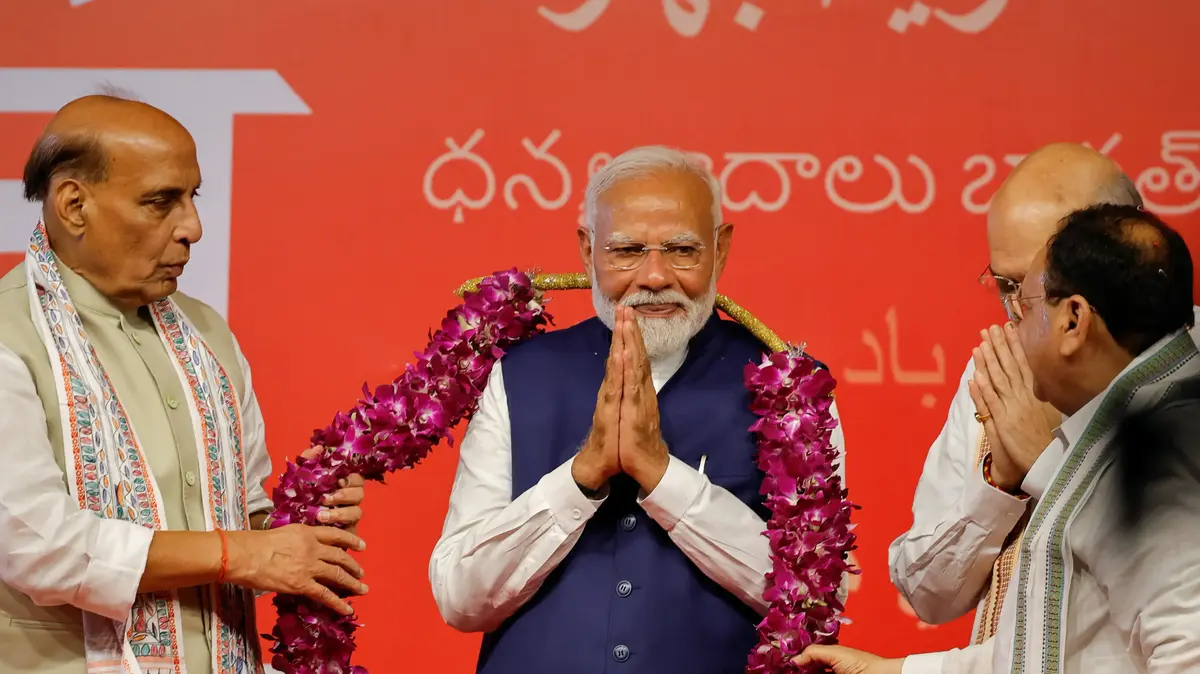Narendra Modi's BJP Coalition Secures Third Term Amidst Electoral Setback
The Hindu nationalist Prime Minister of India, Narendra Modi, announced today the victory of his party, the Bharatiya Janata Party (BJP), and its allies in the recent elections. The BJP and its coalition managed to retain a majority in the Indian parliament, thereby putting Modi on the brink of securing a historic third term. However, the victory came with a tangible reduction in their parliamentary strength, showcasing a mixed result for the ruling coalition.
Modi's campaign primarily focused on the Hindu majority, an approach that has attracted criticism for allegedly sidelining the Muslim population, which numbers over 200 million in India. Despite this strategy, for the first time since Modi's first term in 2014, the BJP will need to rely more heavily on its coalition partners. Official data from the Election Commission showed the BJP winning or leading in 239 seats, a significant drop from the 303 seats it held after the 2019 elections. Meanwhile, the opposition Congress party, under the leadership of Rahul Gandhi, has increased its presence considerably, securing around 98 seats compared to 52 in the previous term.
Mood at both party headquarters reflected the result's complexity. While celebrations broke out at BJP headquarters, there was also an atmosphere of optimism and resilience at the Congress headquarters. Congress party leader, Rahul Gandhi, heralded the election results as a significant pushback against Modi's dominance, stating that 'Voters have punished the BJP.' The overall voter turnout was 36.7% for BJP, slightly lower than in the 2019 elections.
Implications and Market Reaction
The reduced majority for the BJP is seen as a moral defeat and has already led to volatility in the stock markets, with concerns that the narrow majority might hinder Modi's ability to push through reforms. The opposition alliance, a coalition of over 20 parties led by Rahul Gandhi’s Congress Party, has posed the first significant electoral challenge to Modi’s decade-long rule. Although they did not secure enough seats to form a government, the strengthened opposition will likely increase scrutiny on Modi's administration.
The election also highlighted underlying tensions within Indian society, including issues related to inflation, unemployment, respect for the rule of law, and the treatment of minorities, particularly Muslims. In his campaign, Modi made several inflammatory remarks against Muslims, calling them 'infiltrators,' which intensified fears within the minority community about their future under his government.
The electoral process itself was a testament to the scale and complexity of Indian democracy. Voting took place over seven rounds spanning the vast and diverse geography of India. Of the 968 million eligible voters, a turnout of 66.3% was recorded, slightly lower than the previous elections, partly due to a heatwave in northern India.
Among the more unusual outcomes of the election were victories for elected independent lawmakers who are currently serving prison terms, highlighting the complex and often contradictory nature of Indian politics.
As India moves forward, the election results have set the stage for a more contested political environment, with Modi's government facing heightened scrutiny and a more vocal opposition. The next five years in Indian politics promise to be marked by a balancing act between pursuing development goals and navigating the newly strengthened checks from the opposition.
- Modi celebrated the coalition's victory, emphasizing that the citizens of India have put their trust in the alliance 'for the third time in a row.' He pledged to 'continue the good work done in the last decade to fulfill the aspirations of the people.' The BJP’s decreased majority, however, signifies a shift in the political landscape and concisely shows the resilience and gains of opposition parties.
- The BJP’s weakened position also reflects a broader weariness with Modi's governance among voters, who are now leaning towards more diversified political representation. The stock market’s reaction to the election results indicated investor concerns over the BJP's diminished capacity to implement substantial reforms.
- Key leaders from the opposition have expressed determination to hold the government accountable. Arvind Kejriwal, chief minister in Delhi, underlined his ongoing commitment to combating corruption, despite being embroiled in legal challenges himself. The rising momentum of opposition parties signals an impending phase of increased political engagement and legislative contention in India's democracy.






